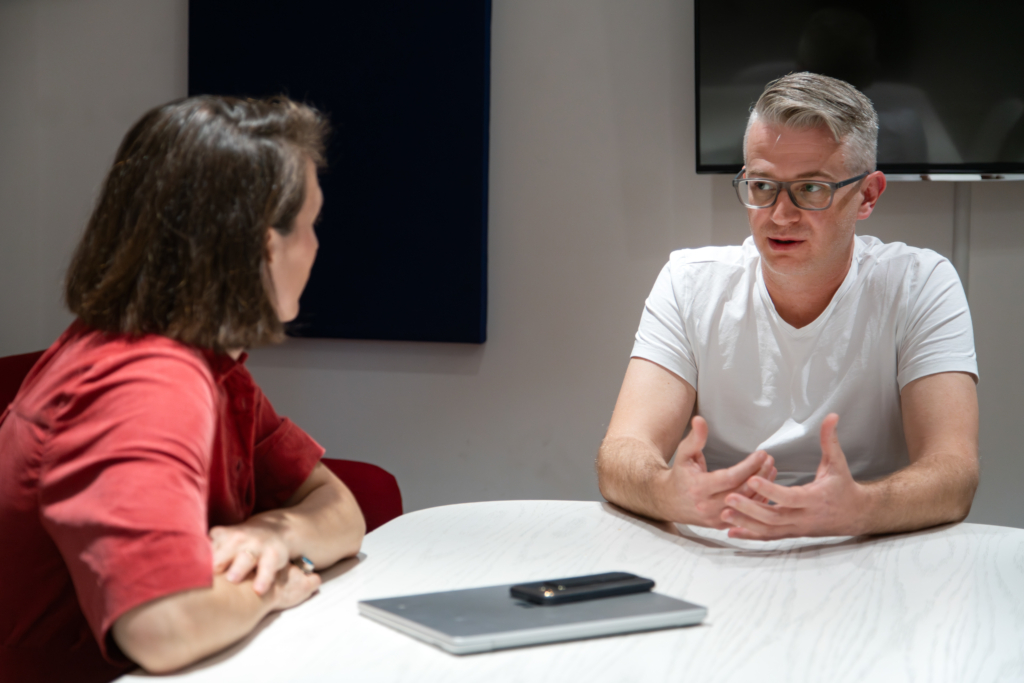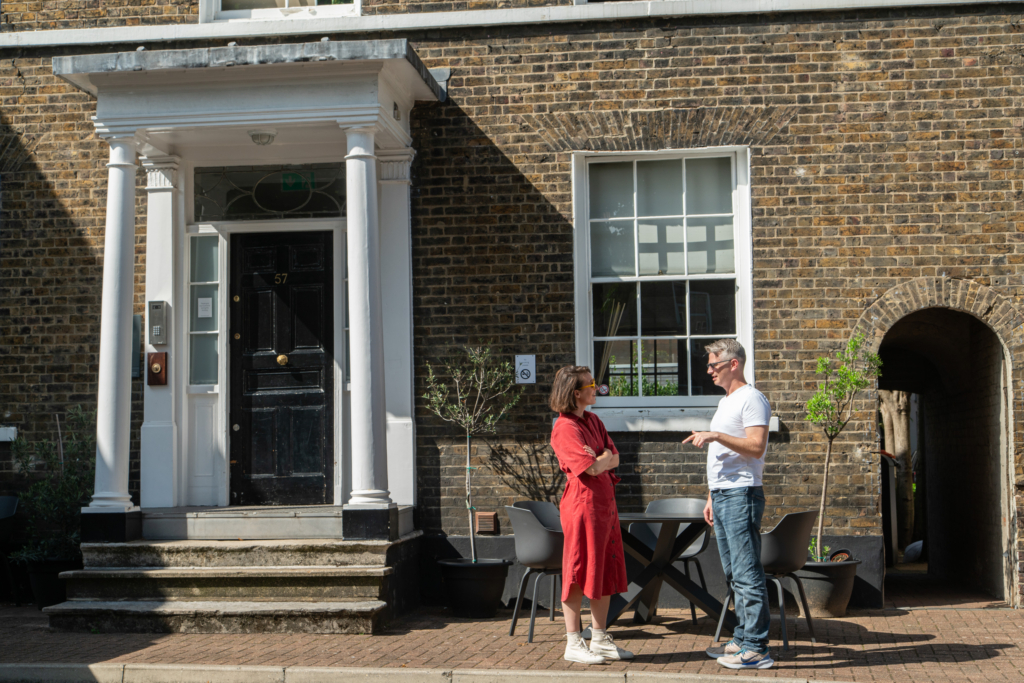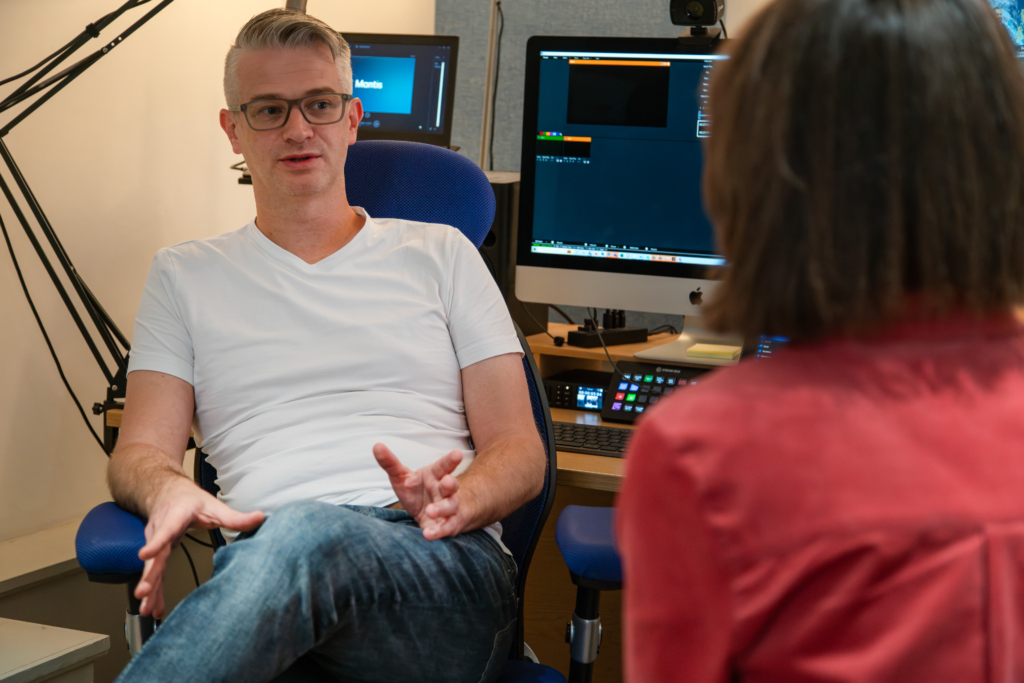And who does that?
“Well, it’s embedded in everybody we work with. We can teach anyone where the buttons go and what they do, but if you’ve got a stressed out person that’s about to go on air and they’re losing their head and you’re the only person in the room, how do you manage that situation? That’s the key bit.
“That’s our focus as a company, because one of the things that we’ve noticed in the 20 years we’ve been in the industry, is the endless sea of mediocre men. There’s thousands of them. And the only women we’ve ever worked with have been exceptional and that’s really depressing because it means that they have to be that good to even be in the same pool as people that don’t care half as much.
“Some of the team that we work with are older. A couple of people that are in their 60s that have been in the engineering game since the 70s and they still know all the latest stuff. They’ve seen it all, they’re not phased by anything. I want to be like that.
When a client is losing their mind and they’re really nervous and they’re sweating, that’s the person that you want to turn around to, someone with that level of experience. It’s kind of pilot-like. ‘Don’t worry. We’ve got this. We do this all day. Just take a breath, concentrate on what your message is.
Ignore the cameras, ignore the lights. Just look at me. We’ve got your back. We’re going to make you look great. Just breathe and speak slowly. You’ll be fine.’ That’s what we do. We do all this, but really, this is just a means to an end to make sure that that person has the best experience they can have.
“And so, in pursuit of that excellence, we found that reverting to type can’t work. The young people nowadays are so scarily brilliant at everything and seem way more worldly than I ever was at their age. They seem to just have more exposure to things and their ‘BS’ detector is so much more finely attuned.
“One of our top producers is 24 and she’s amazing. She’s not fazed by anything. She can have the CEO in her face, and she’ll just say ‘that’s fine, but if you don’t sit down in about 15 seconds, 3.5million people are going to be looking at your bum because you’re standing in the wrong spot, so you want to take a seat? She’s not fazed by these dudes.They’re so professional. And yes, it’s a pleasure to have broken that mould to be hiring predominantly young people.
“Personally, I think rather than trying to incite change just by highlighting it, I think it’s better to just do it, and if that resonates with people and they want to vibrate along and come with us, then that’s fantastic.

And so what affect does this way of hiring have on your projects and your clients?
“Clients are always surprised. They say, ‘That was nothing like what we’re expecting. You understood what we were trying to say. You understood what we wanted to transmit and you had the guts to say what you honestly thought.
Is it because they haven’t worked with a company like yours before, or because of what you do offer and how you do it?
“If you want to help someone, tell them the truth, if you want to help yourself, tell them what they want you to hear. Let’s see if I can find it…
Stuart points to one of the screens on his desk.
“So over here, you can see this TV studio with these two women talking with a tv behind, brick work, nice uplifters, blah, blah, blah. That’s the same studio as Sunday Brunch. This was for an investment bank. They’d done a series of chats about wealth, and they wanted to do a bunch of live streams for their private clients. And they said, how do we make people actually tune in and watch?
The numbers aren’t good, so how do we make it engaging? I looked at the four dudes and I asked, anybody else on the roster by any chance? And she chuckled as the penny dropped. I said, do you have any media people, like journalists, for example, that write for you?
She says, ‘yeah, yeah. We’ve got some’. Fantastic. Right. They’re hosting it. Before it was this big austere TV. Big desk, glass top, lighting, blue moody, you know, so we were like, right, soften this down. We’re going to have bare brick. Going to have some nice up lighters. We’re going to feminise the look of this. We’re going to have some nice low curved chairs. No desk. there’s no authority here, this is a conversation.
So, how did you find your way to Canvas?
“During Covid, I was operating a TV control room in my living room, which obviously was unsustainable. One of our admin assistants found this building, which was only a few doors away, I couldn’t believe it. This gorgeous Georgian building at the end of the road. The product that we really deliver is dealing with people. We take people in some of the most stressful moments in their life and have them look like absolute professionals in front of the camera.
“When we met the Canvas team, we could tell straight away that they genuinely cared about what we did for a living, and they care about how they can provide everything they can to make it easier for us to do our job.
“Nothing has been a problem. They’ve been incredibly facilitating, but it’s the extra stuff. It’s the popping in to have a chat on a rainy day. It’s the emails just saying, ‘I haven’t seen you in a few weeks, how’s things going?’ They don’t need to do any of that stuff, but I think they know who they’re dealing with and they know that that’s our business model as well.
“If the platform that we’re doing your broadcast with is clunky poorly thought out slow and unprofessional, then that’s what you look like as an entire business. That’s what you look like regardless of what you’re saying through the little video.
If the whole experience of people watching it is slow and it doesn’t load properly and stuff, that’s your company. You’re slow, you’re sluggish, you’re clunky you don’t know how to do stuff properly and it’s only a five -minute experience for people that can ruin a company’s reputation.
“We can see that Canvas feel very similar about the bricks and mortar. I can see that that’s how they feel and it’s exactly how we feel about the product that we’re selling and I think that that’s why we work so well together.”

At Canvas, we understand the people behind the business. We take time to understand how your business works, so we can create an environment that works for you as your needs change and grow. If you’d like to explore what it’d be like to have a flexible office provider that cares about so much more than just the bricks and mortar, come and talk to us.





